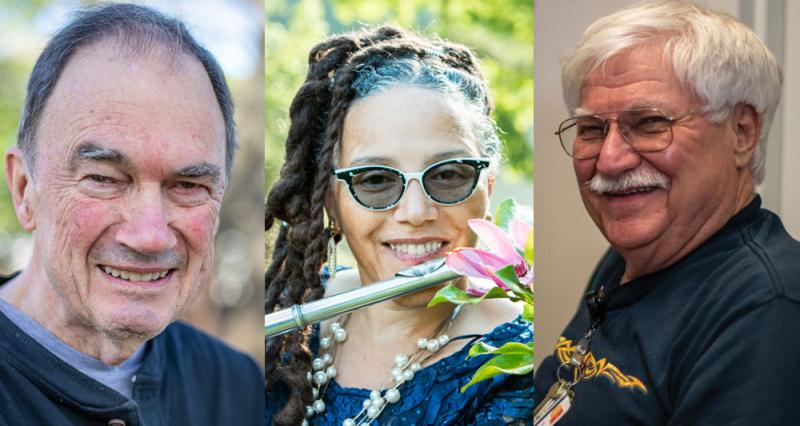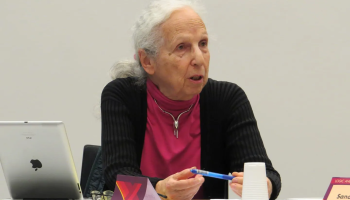Three A&S Professors Elected to American Academy of Arts & Sciences

Three Arts & Sciences faculty members have been elected to the American Academy of Arts & Sciences, the prestigious honorary society and research center announced on April 23.
Astronomy professor Roger Chevalier, Music professor Nicole Mitchell Gantt and Biology professor Raymond Keller join a class of nearly 250 new members elected to the Academy, which dates back to the American Revolution and is considered one of the highest academic honors faculty can attain.
Founded by John Adams and John Hancock, the Academy honors excellence across disciplines to examine new ideas, address issues of importance, and work together “to advance the interest, honor, dignity, and happiness of a free, independent, and virtuous people.”
Other luminaries elected to the Academy over the centuries include Benjamin Franklin and Alexander Hamilton, Charles Darwin, Albert Einstein, Robert Frost, Margaret Mead, Martin Luther King, Jr., Madeleine Albright, Anna Deveare Smith and Salman Rushdie. Along with Chevalier, Gantt and Keller, the 2025 class includes World Central Kitchen founder Jose Andrés, quantum physicist Charles H. Bennett, filmmaker Ava DuVernay, cancer geneticist Kenneth Offit, activist and journalist Gloria Steinem, and novelist Amy Tan.
“There are different ways to measure the talents of a university’s faculty. In terms of public recognition of excellence, election into the American Academy of Arts & Sciences serves as one of the most distinctive awards possible,” said Christa Acampora, Buckner Clay Professor of Philosophy and Dean of the College and Graduate School of Arts & Sciences. “We are immensely proud to celebrate Professors Roger Chevalier, Nicole Mitchell Gantt and Ray Keller, whose elections — representing three distinct fields across the liberal arts and sciences — stand as a remarkable achievement and a testament to the excellence of Arts & Sciences at UVA.”
Roger Chevalier, W.H. Vanderbilt Professor of Astronomy
Elected to the National Academy of Sciences in 1996 in recognition of his distinguished and continuing achievements in original research, Chevalier has carried out pioneering studies over a broad range of topics. His research has expanded our understanding of supernova explosions and their interaction with the surrounding gas, particle acceleration in shocks and the associated radio and X-ray emission, gamma-ray burst explosions, and galactic-scale outflows. His numerous awards included last year’s Distinguished Career Prize from the High Energy Astrophysics Division of the American Astronomical Society for his many contributions.
Steven Majewski, Vanderbilt Professor and chair of the Department of Astronomy, called Chevalier's election to the Academy “a fitting recognition of a career that has profoundly shaped our understanding of the universe."
“His pioneering contributions to astrophysics, particularly in the area of supernovae, stellar winds, and other phenomena related to late stages of stellar evolution and how these shape the evolution of their galactic environments, have not only advanced the field but have also inspired generations of scientists, including many distinguished researchers who he has personally mentored,” Majewski said.
Chevalier said he was deeply honored to be elected to the Academy and to join colleagues he admires "in celebrating the power of discovery."
"This recognition is also a tribute to the students, collaborators and friends at the University of Virginia who have shared — and sustained — my lifelong curiosity about the physical processes in the universe," Chevalier said.
Nicole Mitchell Gant, Music Professor of Composition & Computer Technologies
An award-winning performer, composer, bandleader and educator, Mitchell has used the critically acclaimed, Chicago-based Black Earth Ensemble as her primary compositional laboratory. Perhaps best known for her work as a flutist, Mitchell has developed a unique improvisational language and has been repeatedly awarded “Top Flutist of the Year” by Downbeat Magazine Critics Poll and the Jazz Journalists Association while performing at music festivals and art venues throughout Europe and North America.
Professor Ted Coffey, the Department of Music’s chair, called Mitchell’s election to the Academy “a richly deserved honor.”
“She is an awe–inspiring composer, musician, writer and teacher who has already had transformative effects on the musical culture of the Music Department and University,” Coffey said.
The founder of Black Earth Ensemble, and Ice Crystal, Mitchell composes for contemporary ensembles of varied instrumentation and size, while incorporating improvisation and a wide aesthetic expression. Her past honors and recognitions include a Guggenheim Fellowship (2023) United States Artist (2020), Doris Duke Artist (2012), and a 2011 Herb Alpert Award. Mitchell’s research centers on the powerful legacy of contemporary African American culture and the exploration of creative music as a doorway to the expansion of human consciousness.
“Nicole has a way of delivering you through music,” said assistant professor JoVia Armstrong, a Department of Music colleague and a member of Mitchell’s Black Earth Ensemble. “One moment, you’re playing with her and the band. The next you’re playing by yourself. When you’re a young student, that’s a scary encounter. But it’s the very thing that translates into finding your musical voice and that contributes to learning who you are. Now that's a liberating education.”
Mitchell called her election to the Academy "a breathtaking honor."
"I am encouraged beyond words to be connected to the incredible history of AAAS. It is thrilling to join with major thinkers of the world whose work reaches for the best we can bring to humanity," she said. "I am optimistically encouraged to be inspired by and to contribute to this amazing think tank of interdisciplinary inquiry, creativity, and leadership."
Raymond Keller, Alumni Council Thomas Jefferson Professor of Biology
Keller’s groundbreaking work in the field of developmental biology related to the molecular, cellular, and mechanical mechanisms by which individual cells collectively generate the patterned forces that shape and reshape a developing embryo. His research focused primarily on the embryo of the frog (Xenopus laevis), but Keller did comparative work on other species.
Keller joined the A&S faculty in 1995, following 15 years at the University of California at Berkeley. His lab’s experimental approach involved characterizing region-specific tissue behaviors and their large-scale mechanical interactions by comparing microsurgically isolated explants and corresponding regions of whole embryos. By probing these specialized explant preparations with molecular, pharmacological, microsurgical, and mechanical manipulations under high-resolution imaging, Keller’s work advanced researchers’ ability to determine the molecular and cellular events underlying these tissue-shaping forces.
A repeat winner of the Department of Biology’s Teaching Award, Keller taught a popular, long-running developmental biology research laboratory course for undergraduates. Keller also has taught in the Embryology Course, the Marine Biological Laboratory in Woods Hole, Mass. and at the Cold Spring Harbor Laboratory on Long Island, New York. In 2020, the Society for Developmental Biology honored Keller with its Lifetime Achievement Award.
From South Korea, where he is attending his son's wedding, Keller described his reaction to the news from the Academy.
"I am honored, humbled, delighted, and thankful, all in one breath," Keller emailed. "I am especially thankful for my mentors, colleagues, students, and postdocs, all those who have shared my journey and nourished the Keller lab over the years, in both good and challenging times."
Historically, 62 University of Virginia faculty members have been elected to the Academy. Chevalier, Gantt and Keller join five other current A&S faculty members and 10 emeritus and retired A&S faculty who are academy members:
· Cora Diamond (Philosophy, retired), elected 2024.
· Eric Turkheimer (Psychology), elected 2021;
· Jahan Ramazani (English), elected 2016;
· Alan Taylor (History, emeritus), elected 2016;
· Donald F. Hunt (Chemistry), elected 2014;
· Peter Onuf (History, emeritus), elected 2014;
· Stephen Plog (Anthropology), elected 2014;
· Chip Tucker (English, emeritus), elected 2011;
· Gerald L. Clore (Psychology, emeritus), elected 2010;
· Judy S. DeLoache (Psychology, emeritus), elected 2009;
· Timothy D. Wilson (Psychology, emeritus), elected 2009;
· Rita Dove (English), elected 2006.
· Rachel Keen (Psychology, emeritus), elected 2006;
· Ann Beattie (English, emeritus) elected 2004.
· Charles Wright (English, emeritus) elected 2002.
Induction ceremonies for new members will take place in Cambridge, Mass. in October.





